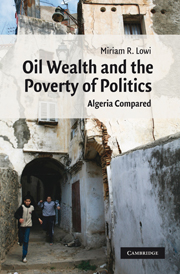Book contents
- Frontmatter
- Contents
- List of tables
- List of figures
- Preface
- Map of Algeria
- Part I Introduction
- Part II Algeria and its discontents
- 3 From conquest to independence
- 4 The elaboration of a system
- 5 From boom to bust, and … verging on breakdown
- 6 The persistence of violence and the process of re-equilibration
- Part III Comparisons and conclusions
- 8 Conclusions: oil wealth and the poverty of politics
- Bibliography
- Index
- CAMBRIDGE MIDDLE EAST STUDIES 32
3 - From conquest to independence
Published online by Cambridge University Press: 29 March 2010
- Frontmatter
- Contents
- List of tables
- List of figures
- Preface
- Map of Algeria
- Part I Introduction
- Part II Algeria and its discontents
- 3 From conquest to independence
- 4 The elaboration of a system
- 5 From boom to bust, and … verging on breakdown
- 6 The persistence of violence and the process of re-equilibration
- Part III Comparisons and conclusions
- 8 Conclusions: oil wealth and the poverty of politics
- Bibliography
- Index
- CAMBRIDGE MIDDLE EAST STUDIES 32
Summary
The weakening of the state and the onset of civil violence in post-colonial settings must be understood within the framework of the creation of the modern state. The establishment of institutions that impose rules, resolve internal conflicts, distribute rights and resources, integrate disparate communities, and enunciate a policy direction and a shared sense of purpose remains the principal and most consequential challenge for the modern state. Where imperial domination prevailed, legacies remained that would color the state- and nation-building experience in diverse ways. The more intense the foreign occupation and control, the more destructured the domestic society and its mechanisms of social regulation. This has made the unification of territory, the choice of institutions, and the centralization of power and authority that much more complicated.
Algeria had been a settler colony. As of 1848, the French government transported thousands of European nationals across the Mediterranean to settle in the new colony and establish themselves there indefinitely as bona fide residents. In 1962, just before independence, the settler community constituted 10 percent of the population; there were European families in Algeria which had lived there for more than 100 years. Moreover, while there was, in colonial Algeria, a European sphere and an indigenous sphere, the Europeans dominated politics and the economy absolutely.
In 1962, 90 percent of the European community left Algeria en masse over a period of six months. It left behind an impoverished institutional environment.
- Type
- Chapter
- Information
- Oil Wealth and the Poverty of PoliticsAlgeria Compared, pp. 47 - 73Publisher: Cambridge University PressPrint publication year: 2009

